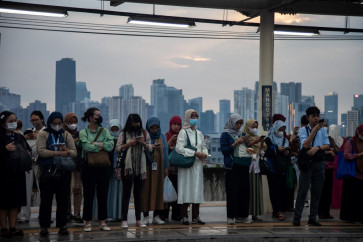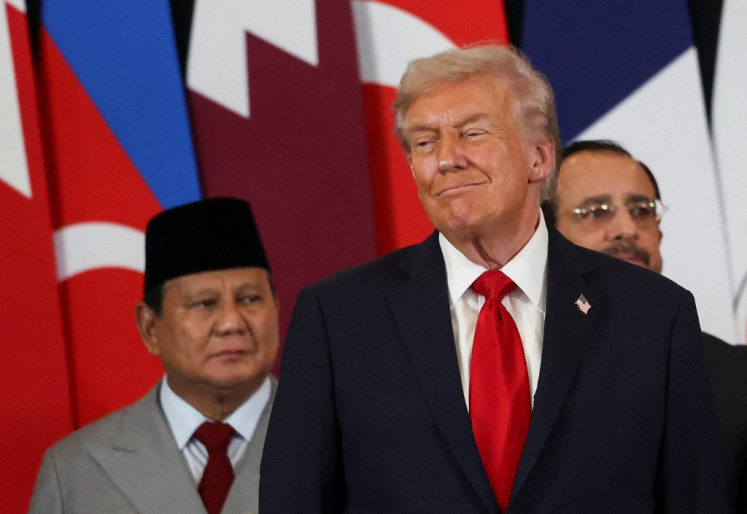Popular Reads
Top Results
Can't find what you're looking for?
View all search resultsPopular Reads
Top Results
Can't find what you're looking for?
View all search resultsRI's economy to slightly recover in 2020
Indonesia’s economy is expected to perform slightly better in 2020 on the back of improved commodity prices and easing external pressures, economists have said
Change text size
Gift Premium Articles
to Anyone
I
ndonesia’s economy is expected to perform slightly better in 2020 on the back of improved commodity prices and easing external pressures, economists have said.
In its latest Global Economic Prospect report, the World Bank forecast Indonesia would book 5.1 percent GDP growth in 2020 and 5.2 percent in 2021. The figures were 0.2 percent lower compared with its June 2019 projection.
“Growth in Indonesia, which depends less on export growth than other regional economies, is projected to tick up to 5.1 percent [in 2020] reflecting continued support from private consumption, a pickup in investment, growth of the working-age population and improving labor markets,” the Washington-based development bank wrote in a statement.
Global growth, meanwhile, was set to pick up by 2.5 percent this year, higher than the 2.4 percent projected for 2019, driven by higher growth in emerging markets and developing economies, amid a recovery in global trade and investment.
Indonesia’s economy grew by 5.02 percent in the third quarter last year, the latest data available, constituting the slowest growth in more than two years. Consumer spending, which accounts for more than half of GDP, stagnated while investment cooled and exports slumped.
This year, the government expects to achieve 5.3 percent growth as stipulated in the 2020 state budget.
Samuel Sekuritas economist Lana Soelistianingsih expressed optimism that the economy could grow faster this year compared with 2019 amid dissipating global uncertainties.
“We are projecting 5.09 percent growth for 2020, slightly better than the 5.04 percent growth projection [in 2019],” Lana said recently. “The outlook is supported by reduced global uncertainties with the trade deal, although it is yet to be signed, achieved between the United States and China.”
The US and China recently struck a “phase-one” trade deal in a move that will defuse tensions between the world’s two largest economies. The deal is set to be formally signed this month.
The deal includes the US halting its import tariff increase on US$160 billion worth of Chinese goods to 15 percent, while China also commits to increasing its purchase of American products and services by at least $200 billion over the next two years to cut its trade deficit with the US.
Center of Reforms on Economics (CORE) Indonesia executive director Mohammad Faisal, meanwhile, projected the economy to expand between 4.9 and 5.1 percent this year. He was of the view that it would be hard for the country to grow faster than the upper range of the projection as adjustments in some government-administered prices could impact people’s purchasing power this year.
“The BPJS Kesehatan’s [Health Care and Social Security Agency] premium hike and the increase in tobacco excise [this year], which have a sizeable impact particularly for middle-lower income households, could affect people’s purchasing power,” said Faisal.
Increased inflationary pressures on several administered prices would likely have a more lasting impact compared with that of the improved outlook for commodity prices this year, which was expected to augment the income of commodity producers across the country, Faisal added.
The consumer price index stood at a record low of 2.72 percent last year as administered-price inflation drastically dropped to 0.51 percent from 3.36 percent in 2018, Statistics Indonesia data show. Meanwhile, core inflation stood at 3.02 percent last year, slightly lower than the 3.07 percent inflation booked in 2018, while volatile food prices went up 4.3 percent, higher than the 3.39 percent a year before.
Faisal also expected an “incremental” investment growth rebound in 2020 after the “political year” of 2019 although the proposed government efforts at deregulation through omnibus laws are not expected to immediately remove barriers to investments.
“The deregulation efforts to ease investment will not be optimal because the omnibus laws will be implemented in the second half of the year at the earliest,” said Faisal.
The government is set to amend more than 1,000 articles in more than 70 prevailing laws through an omnibus law on job creation in a sweeping structural reform aimed at improving Indonesia’s competitiveness in the eyes of investors. It is also preparing at least two other omnibus bills on taxation and small and medium enterprises.
Meanwhile, Bank Central Asia Group’s economic, banking and industry research team wrote in a research note that Indonesia’s GDP remained “locked into a high-floor, low-ceiling trajectory” in the near term as robust domestic demand anchored growth but further expansion was constrained by a widening current account deficit (CAD).
The CAD, where the country imports more goods, services and capital than it exports, creates a foreign exchange liquidity gap that needs to be financed by a surplus in the capital and financial account.
The team calculated that the economy expanded by 5 percent last year but this would fall to 4.9 percent in 2020. The CAD, meanwhile, is expected to widen from 2.7 percent of GDP in 2019 to 2.9 percent of GDP in 2020.










